
by Henry L. Liao
Forget it never.
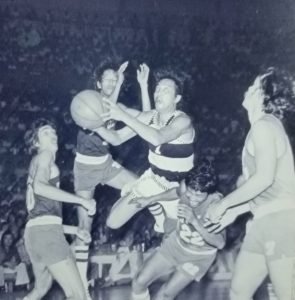
They were the darkest days in Philippine basketball history. And it came just 4.5 months after martial rule was declared in the country. Who would have thought that something hanky-panky was going on in local ball when most of us Filipinos were quite apprehensive and living in fear because men in uniform were roaming everywhere in the streets?
In July 1973, Filipino hoop fans were scandalized by the game-fixing and point-shaving activities that erupted in the best-of-three All-Filipino championship series of the Manila Industrial and Commercial Athletic Association (MICAA), the premier amateur league in the land at the time.
Throwing a game is the gravest offense in any sport and the scandal was a big blow to Philippine basketball at the time – a monumental blackeye that put to question the integrity of the game at the highest level.
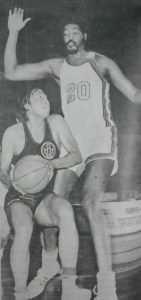
Six players from the country’s top commercial team at the time, Crispa-Floro, were banned for life by the Basketball Association of the Philippines (BAP), then recognized by the International Basketball Federation (FIBA) as the country’s national basketball federation, for their shady activities in the games they played in.
The six players, namely, two-time Olympians (1968 Mexico/1972 Munich) Danilo Florencio and Adriano Papa Jr., and 1969 ABC veteran Rudolf Kutch, Reynaldo Alcantara, Virgilio Abarrientos and Ernesto De Leon – all of whom saw action for venerable Crispa coach Virgilio (Baby) Dalupan during their University of the East days – admitted to throwing Game One of the best-of-three MICAA All-Filipino finals between Crispa and Mariwasa in 1973 in exchange for a fee of P3,000 each. Undoubtedly, it was a huge amount during the time.

The series opener was held on February 4, 1973. The Mariwasa Akai Recorders beat the Redmanizers, 79-77, in the series opener and then wrapped up the title series two days later with an 84-80 decision. The coach of the Mariwasa squad was Valentin (Tito) Eduque, who as it turned out, was later named to coach the Philippine team to the ABC games in December that year.
Shortly after the championship series, Crispa team manager Valeriano (Danny) Floro dropped Papa and company from his team in a move which caught countless basketball fans by surprise since the six players had been chiefly responsible for the Redmanizers’ numerous title victories in the past.
It took some time, though, before the lid off the scandal was blown off in a story by a national daily newspaper on July 13 that year that sent our basketball-crazy country into a frenzy.
It became public after the Philippine Constabulary (the harbinger of the Philippine National Police) Metrocom released its investigative report.
The next day, five of the six players initially named implicated four other teammates the next day.
On July 18, the MICAA Board meted the six players a lifetime ban. “They have lost the privilege to play in any MICAA team in view of the fact that by their own admission they received money to deliberately lose the game or to shave points,” it said in a press statement.

The BAP followed suit a day later, “banning and expelling” the six athletes from the sport.
In defining the lifetime ban meted out, the BAP said that Papa and his companions were prohibited from playing basketball in any game, league or tournament recognized, sanctioned or sponsored by the BAP.
Likewise, they were also banned from coaching and from acting as referees or team officials or team followers in all events sanctioned or sponsored by the BAP.
According to a report by the Metropolitan Police Investigation Service that investigated the case, the manipulation of basketball results by way of point-shaving and game-fixing, especially in the MICAA, by gambling syndicates.
The BAP’s own investigation panel also found out there were fixes in four other games of Crispa – against San Miguel Corporation, Mariwasa Akai, Concepcion Industries and Yco – in the second round of the same MICAA All-Filipino series.
According to Papa, two days before the February 4 game, an “unidentified” man gave him the P3,000 in his residence. He was asked to contact the other players.
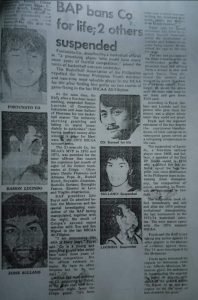
Papa even insinuated, unfairly without any solid proof, that anomalies in big-time basketball were already in existence during the time of Carlos Loyzaga and Lauro Mumar in the 1950s and early 1960s. Papa, a deadeye-shooting 5-11 forward out of National University, was already playing commercial ball with the famed Ysmael Steel Admirals at the time.
The admission of guilt by Papa and his companions opened a can of worms as well. The six cagers banned claimed that teammates Fortunato (Atoy) Co Jr., Rodolfo Soriano, Reynaldo Franco and Johnny Revilla also had a hand in the fixing of the games and received various amounts of money from the gambling syndicate operating in Chinatown (which was engaged in betting MICAA games that ran to as much as six figures) in consideration for their participation. Even the name of William (Bogs) Adornado, then the country’s No. 1 forward, was mentioned by them. Adornado, however, escaped unscathed and was eventually cleared of any transgression.
In their respective signed statements, Kutch, Abarrientos, Florencio, Alcantara and De Leon principally implicated Co Jr. to the scandal, stating that it was the popular Fortune Cookie who introduced them to two Chinese from a gambling syndicate in Binondo who had wanted them to shave points in the first game of the best-of-three MICAA All-Filipino finals between Crispa and Mariwasa. Furthermore, the five men said that it was Co who gave them the money (P3,000 each) after the game.
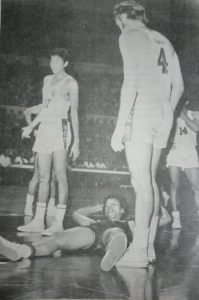
Co denied the accusations. In his own sworn statement, Co said that just before Crispa’s game against Mariwasa on February 4, Abarrientos told him at the Ambassador Apartments on A. Mabini Street, in Ermita, Manila that somebody would give them P3,000 each if they threw away the game. Co said he refused the offer. He added that Abarrientos also made the same offer to Johnny Revilla, Reynaldo Franco and Rodolfo Soriano. In his own version of the scandal, Papa swore that it was Abarrientos who had contacted him and informed him of the game-fixing plan in two instances – the first game of the Crispa vs. Mariwasa best-of-three MICAA All-Filipino title series – and the Crispa vs. San Miguel game in the second round of the eliminations.
Upon interrogation by the Metrocom, Co, Soriano, Franco and Revilla later admitted in their own sworn testimonies that they, too, received bribes for taking part in those point-shaving schemes, including payment of P1,000 each to manipulate the score of Crispa’s title playoff game against Mariwasa on February 4, 1973.

In a second-round game against the Yco Painters, it was said that the 10 aforementioned players also received P1,000 each as the consideration for entering into a point-shaving agreement and were also found to have bet on Crispa’s opponent for P1,000 each.
Just before the Crispa vs. Yco contest during the qualifying phase, Co said it was Kutch who instructed him to call up a certain Philip (a Chinese). Kutch later talked to Philip. Crispa lost the game apparently as planned and two days later, Kutch again instructed Co to go to the Chinese businessman’s address and when he got there, he was given P1,000 which he said he gave to Kutch.
To extricate himself from the game-fixing anomaly, Co further said that in the game against San Miguel, he was approached by Abarrientos, who whispered to him that they would each get P1,000 to throw the game. They also lost that game, and, according to Co, he was on his way home when Abarrientos passed him by in his car and handed to him an envelope containing only P500.
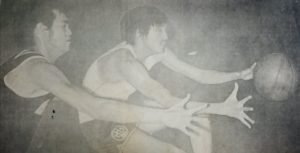
On July 26, the BAP Board, in a unanimous vote, banned Soriano and Franco for life after the pair was found guilty of point-shaving and betting in the MICAA games. In the same decision, Adornado and Revilla (then in the midst of a two-year BAP suspension for figuring in a fight with Olympian Rogelio “Tembong” Melencio in a game) were cleared of the offense for insufficiency of evidence.
Franco admitted to the BAP special committee that he agreed to shave points and place bets in four Crispa games – vs. Concepcion, Mariwasa, San Miguel Corporation and Yco in the qualifying rounds – for a sum.
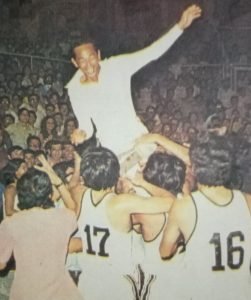
Soriano admitted only to having bet and shave points during the Crispa vs. Yco games during the elims.
Co’s case was initially held in abeyance after new developments cropped up. By September 1, however, the former two-time NCAA MVP (1970 and 1971) from Mapua Tech, who had acquired Filipino citizenship through naturalization the year before to become eligible to play for the Philippine team to the 1972 Asian Youth Basketball championship held in Manila, became the ninth Crispa player to be banned for life by the BAP after being found guilty of game-fixing in two instances in the 1973 MICAA All-Filipino series.
For the record, the lineup of Crispa for that MICAA All-Filipino tournament was composed of Abarrientos, Adornado, Alcantara, Co, Ceferino De la Paz, De Leon, Florencio, Franco, Kutch, Papa, Daniel Pecache, Revilla and Soriano.
In the same September 1 meeting, the BAP also suspended Concepcion Industries’ Ramon Lucindo and his former teammate Jesse Sullano of Mariwasa for one basketball season “for indirectly abetting gambling and failing to report immediately to authorities” their having received money – P800 for Sullano and P300 for Lucindo – in winning a game. The two conspired to make Mariwasa win by more than 14 points in a game against the Yutivo Opels at the Rizal Memorial Coliseum during the 1972 MICAA summer series.
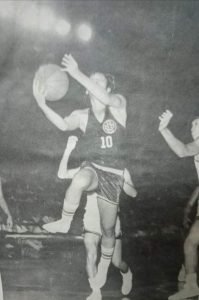
As a result of the scandal, the BAP Board amended the two-year college prohibition requirement to four years, effective immediately, to prevent any commercial or industrial club team, league or tournament from further exploiting and exposing to monetary enticements the best college players at the time.
Because of the lifetime ban, Florencio, Papa, Co and Soriano were disqualified from suiting up for the Philippine national team to the 7th Asian Basketball Confederation (ABC) held in Manila in December 1973.
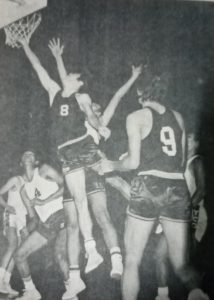
If not, Papa, Florencio and Co would have been shoo-ins to don the national colors, with Papa and Florencio having competed for the country in the 1972 Munich Olympics in Germany.
Eventually, all nine players slapped with a “lifetime” ban by the BAP were forgiven for their “crimes” and their punishments reduced. Be that as it was, though, their dastardly acts won’t be forgotten by local basketball chroniclers. The ban, as it turned out, lasted only a year to some and 14 months to the others.
While Papa retired from international competitions, Co, Florencio and Soriano went to represent the country during the Tehran Asian Games in September 1974 with Kutch being one of the two alternates on the team (the other being Jaime Noblezada).
All nine men also joined the professional basketball league Philippine Basketball Association (PBA) when it debuted on April 9, 1975.
There have been rumors of game-fixing or point-shaving activities in the various basketball leagues – including collegiate ball – in the succeeding decades but they all were hard to substantiate.
The 1973 scandal rocked Philippine basketball to the core. Never should another scandal of such magnitude bring Philippine basketball down to its knees once again.
- LeBron James’ limited availability puts All-Star hopes in question - January 22, 2026
- Around the NBA: Jokic’s Record Night, Lakers Exposed, Thunder Warning Signs - December 27, 2025
- Northport draft pick joins long list of Tiong Lian alumni in PBA - September 11, 2025

![Kai Sotto [FIBA.com photo]](https://sportsbytes.com.ph/wp-content/uploads/2021/01/4622.jpg)
![PH National Team that won the bronze in 1954 World Basketball in Rio de Janeiro. [Henry Liao photo]](https://sportsbytes.com.ph/wp-content/uploads/2021/01/144429345_221818172990075_1891445414791191084_n.jpg)
![The 1954 Nationals that won the bronze medal in the 1954 World tournament. [Henry Liao photo]](https://sportsbytes.com.ph/wp-content/uploads/2021/02/144950691_774393143285027_3026363166572188338_n.jpg)